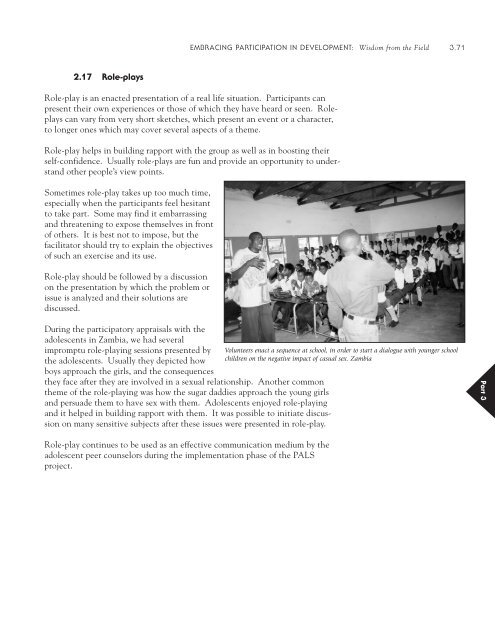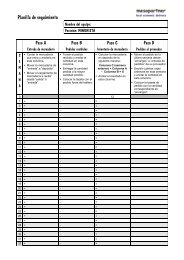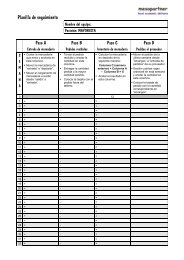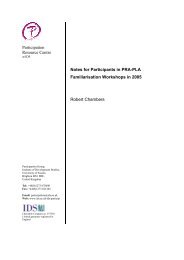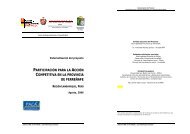PRA-Manual Embracing Participitation tools-only.pdf - PACA
PRA-Manual Embracing Participitation tools-only.pdf - PACA
PRA-Manual Embracing Participitation tools-only.pdf - PACA
You also want an ePaper? Increase the reach of your titles
YUMPU automatically turns print PDFs into web optimized ePapers that Google loves.
EMBRACING PARTICIPATION IN DEVELOPMENT: Wisdom from the Field 3.71<br />
2.17 Role-plays<br />
Role-play is an enacted presentation of a real life situation. Participants can<br />
present their own experiences or those of which they have heard or seen. Roleplays<br />
can vary from very short sketches, which present an event or a character,<br />
to longer ones which may cover several aspects of a theme.<br />
Role-play helps in building rapport with the group as well as in boosting their<br />
self-confidence. Usually role-plays are fun and provide an opportunity to understand<br />
other people’s view points.<br />
Sometimes role-play takes up too much time,<br />
especially when the participants feel hesitant<br />
to take part. Some may find it embarrassing<br />
and threatening to expose themselves in front<br />
of others. It is best not to impose, but the<br />
facilitator should try to explain the objectives<br />
of such an exercise and its use.<br />
Role-play should be followed by a discussion<br />
on the presentation by which the problem or<br />
issue is analyzed and their solutions are<br />
discussed.<br />
During the participatory appraisals with the<br />
adolescents in Zambia, we had several<br />
impromptu role-playing sessions presented by<br />
the adolescents. Usually they depicted how<br />
boys approach the girls, and the consequences<br />
they face after they are involved in a sexual relationship. Another common<br />
theme of the role-playing was how the sugar daddies approach the young girls<br />
and persuade them to have sex with them. Adolescents enjoyed role-playing<br />
and it helped in building rapport with them. It was possible to initiate discussion<br />
on many sensitive subjects after these issues were presented in role-play.<br />
Volunteers enact a sequence at school, in order to start a dialogue with younger school<br />
children on the negative impact of casual sex. Zambia<br />
Part 3<br />
Role-play continues to be used as an effective communication medium by the<br />
adolescent peer counselors during the implementation phase of the PALS<br />
project.


